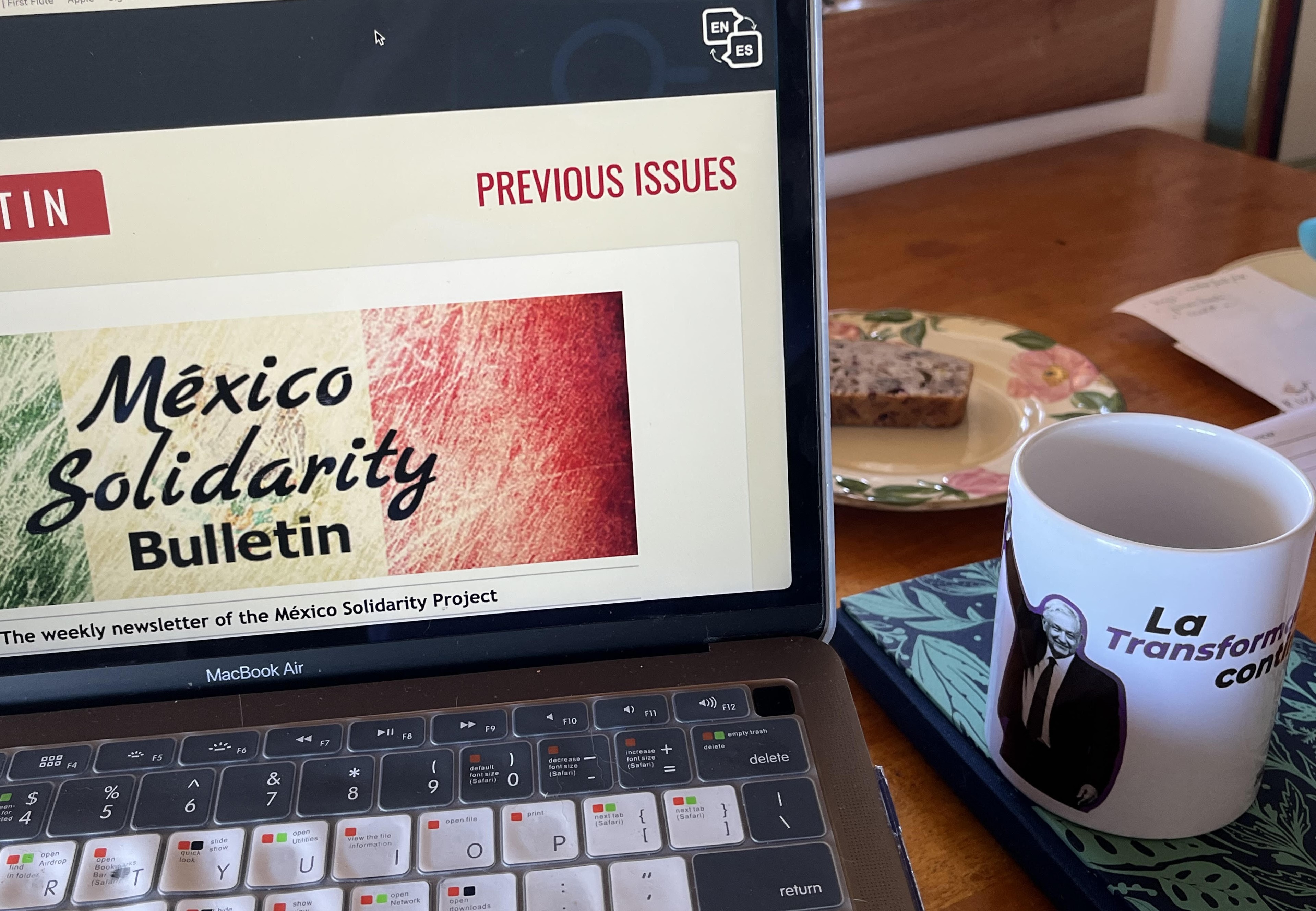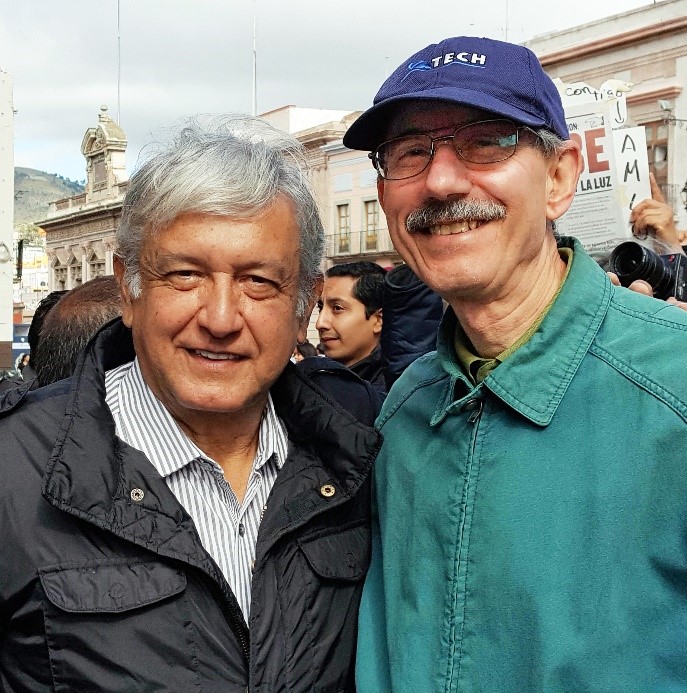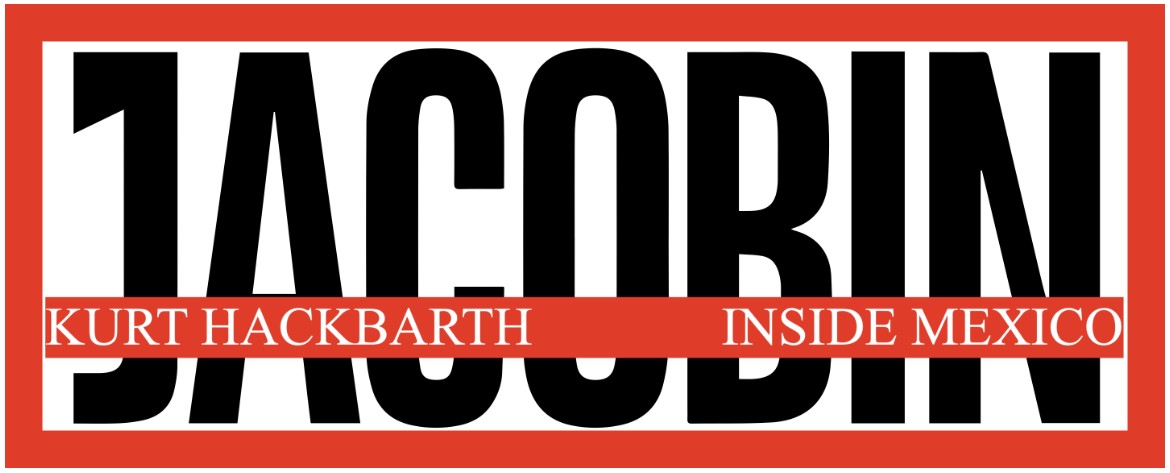|
|
|
|
The weekly newsletter of the México Solidarity Project |
|
|
|
Online at mexicosolidarityproject.org |
|
July 19, 2023/ This week's issue/ Meizhu Lui, for the editorial team |
|
|
Good Newsletters Make for Good News |
|
Whether you’re a standard-issue politician, a right-wing zealot, or a left-wing organizer, you’re got to get your message out to an expanding number of people to win them to your cause. That’s the refrain those of us who work on this México Solidarity Bulletin have grown accustomed to hearing from the veteran progressive editor Sam Pizzigati, the architect of this newsletter who’s stepping down from his editing responsibilities with this week’s issue.
That “Solidarity” in our newsletter title? Sam always emphasizes solidarity as something, well, solid! Not abstract, not just words or good intentions. To him, solidarity grows from making people-to-people connections, from hearing the “Voices” of real people as they talk about their lives and hopes, from taking on their burdens and aspirations as your own.
A good newsletter, Sam says, starts to feel like an old friend who drops by for coffee once a week. You look forward to that half hour of conversation, sometimes sad, sometimes inspiring, sometimes entertaining — but never boring. Good news? That’s getting a good newsletter in your email inbox.
And now Sam is moving on, passing on the torch, and this issue will be his last. We’ve invited our dauntless editor, before he goes, to come out from behind his desk. With all the “Voices” Sam has edited over the years, we thought it fitting that the “Voice” we spotlight this week, before our annual two-week summer break, be his own.
But Sam’s not done. His writing will continue to alert more and more people to the dangers of growing economic inequality and the need for solidarity with the people of México. We say farewell but not good-bye, with much gratitude and affection. |
|
|
|
Don’t miss an issue! Sign up for a free México Solidarity Bulletin subscription. |
|
|
|
|
From an Activist Editor: Publishing for Solidarity |
|
Sam Pizzigati has been co-editing the México Solidarity Bulletin since this weekly first appeared three years ago. But he’s been editing progressive publications for over 50 years, including over 20 spent managing the publications of the 3-million-member National Education Association. Currently an Institute for Policy Studies associate fellow, Sam is now stepping back from the weekly México Solidarity Bulletin to finish his fifth book on economic inequality. We’ve asked him to share his experience and lessons on communicating for effective advocacy. |
|
|
What made you decide to spend so much of your time helping to build solidarity between people in the United States and people in México?
Like the vast majority of progressives in the United States, I entered the 21st century with only a vague sense of what was going on in México. We all knew — and know — much more about Central American political realities than about Mexican.
Some of that Central American sense I imbibed first-hand as part of the first U.S. trade union fact-finding delegation to El Salvador in 1983. We met with guerrilla leaders in the mountains and insurgents in the cities. We also met with Salvadoran generals, in mansions behind ten-foot-high walls topped by razor wire and broken glass, and with business leaders around their secure conference tables.
I still remember one of those expensively suited businessmen talking disdainfully about Salvadoran peasants. He clearly and simply saw them as “beasts of burden” and nothing more. So I had a vivid sense of the ongoing class struggle “south of the border,” but that sense didn’t include México.
That all changed when you became part of an extended Mexican family? |
|
Yes, early in the 2000s, I found myself with a Mexican daughter-in-law and a wonderful new Mexican family that included progressive activists who would later become staunch supporters of AMLO and Morena. I learned a great deal from them all, and I began to see U.S. relations with-México through an entirely new prism.
I soon realized that progressives in the United States had more to learn about making social change from our Mexican counterparts than the other way around. Here in the United States, we’re constantly playing defense against the right. They’re playing offense — and winning. |
|
So four years ago, the moment I met the U.S. activists involved in the new México Solidarity Project, I jumped at the chance to help spread the word about the amazing work Mexican progressives are doing.
And you brought some international solidarity experience to that work?
In the late 1970s, a bunch of us U.S.-based progressives interested in the struggle then unfolding in Italy organized a national group to work against U.S. interference in Italian politics. The traditional Italian left and the young Italian “New Left” appeared, back then, on the verge of gaining enough power to reshape the corrupt U.S.-backed status quo. |
|
|
Sam Pizzigati with Andrés Manuel López Obrador, |
|
We wanted to help give those Italian progressives the breathing space they needed to forge real change. But we didn’t succeed, partly because we had nothing close to the resources needed to spread the word — within the Italian-American community and beyond — about what was going on in Italy. |
|
We did our best. We held events in New York, San Francisco, and Washington. We published and mailed out a regular newsletter.
But we couldn’t sustain the effort. In those pre-Internet days, communicating carried heavy costs.
The post-Internet day we’re in now brings other difficulties: too many choices, too much information. Do you have any recommendations for meeting the communications challenges we face today? |
|
|
Photo: www.mimeo.com |
|
Communication — spreading the word — is job one in organizing. But how can you grab and hold people’s attention? I see too many groups on the left publishing newsletters that assume that readers want to know all about the work their particular group is doing. No, readers want to know what’s happening on the issues and struggles they care about. These two perspectives certainly do overlap, but not completely. Successful progressive newsletters give off the vibes of the latter. |
|
Do you have more optimism now for the future of international solidarity efforts?
Much more. The online world, social media — all this gives us a real shot at reaching large numbers of people. We can, for instance, publish and distribute a weekly issue of the México Solidarity Bulletin at a tiny fraction of the cost that printed-and-mailed communications used to demand.
But we see real political progress in this new online world only when subscribers become far more than passive readers. Success only comes when subscribers to efforts like the México Solidarity Bulletin become active sharers of information, when they forward the weekly Bulletin issues they receive to friends and co-workers, when they post links to interviews that appear in the Bulletin in their social media streams.
The more that readers play this activist role, the more of a difference we can all make together. Mexicans are marching down a road that has the potential to make their country a worldwide inspiration for progressive social change. We Americans have a lot we need to change. The more we can learn from what’s going on in México, the better our shot at making our own transformation. |
|
|
México’s Full Recognition of the Palestinian State |
|
In fealty to US foreign policy, México has long refused to recognize Palestinian statehood. That has just finally changed, with AMLO’s government officially acknowledging Palestinian statehood and establishing a full embassy in México City, as veteran political journalist Kurt Hackbarth explains in this analysis drawn from his coverage of Mexican political affairs that appears regularly in the Jacobin journal. |
|
In 1975, México established diplomatic relations with the Palestinian Liberation Organization. In 2010, practically the entirety of Latin America recognized the Palestine state — but not México. By then, México’s neoliberal government subordinated itself to US foreign policy. |
|
|
In recent years, Israel security firms have plied their wares within Mexico, with toxic results. In 2011, the Defense Department of conservative president Felipe Calderón became the first in the world to acquire the infamous Israeli Pegasus spy software.
In his 2012 administration, president Pena Nieto employed it widely, spying on journalists, businesspeople, human rights lawyers, and politicians, including current president Andrés Manuel López Obrador and some fifty members of his family and inner circle.
A prime mover of Pegasus in the Peña Nieto administration was Tomás Zerón. As head of the Criminal Investigation Agency, a now-defunct part of the Attorney General’s Office, Zerón authorized the purchase of millions of dollars’ worth of spy software from Israel.
In September 2014, forty-three students from the Normal Rural School of Ayotzinapa were disappeared in the town of Iguala, Guerrero. As the head of the Criminal Investigation Agency, Zerón was assigned to lead the investigation, a task he performed with a singular combination of cruelty, mendacity, and ineptitude.
Zerón and his team actively interfered in the investigation, planting evidence at the site where the students’ bodies were allegedly burned and obtaining evidence through torture. In a video released in 2020, Zerón, dressed in black and marching around the cell like a grand inquisitor, is seen interrogating a semi-naked, hooded suspect identified as Felipe Rodríguez from the Guerreros Unidos cartel.
“Just one fuckup and I’ll kill you, buddy,” Zerón is heard to say.
All of this led to Zerón and Attorney General Murillo Karam creating an official “historic truth”: that the students were killed by the cartel, which mistook them for a rival gang, a self-serving thesis that has since then been totally discredited. Murillo Karam was arrested in August 2022 on charges of torture, forced disappearance, and obstruction of justice.
An arrest warrant had earlier been issued for Zerón in 2020. But the grand inquisitor had already fled the country, first to Canada and then to Israel. AMLO’s government requested his extradition in September 2021 and renewed that request last month. Israel has refused.
It's hard to overestimate how Israel’s shielding of Zeron has rankled public opinion in México. AMLO has returned to the subject repeatedly in his morning press conferences, calling clearing up what really happened to the young people at Ayotzinapa “most important to us.” Adds AMLO: “No nation should protect torturers, much less a country whose people have suffered from tortures.”
Despite massive US State Department pressure, México has moved a step further from Washington and closer to the settled regional consensus in Latin America. With México’s increasing clout, this decision will have international resonance. |
|
|
Recent news reports and commentaries, from progressive and mainstream media, in life and struggles on both sides of the US-México border
Rafael Bernal, Top Mexican diplomat: US elections ‘will fuel the flames of xenophobia and racism,’ The Hill. México’s new top diplomat, Alicia Bárcena, has subtly criticized Mexican governments of the past 30 years for turning their focus toward North America and away from the Caribbean and South and Central America.
Sharon Sustaita, Claudia Sheinbaum responde a polémica por entrevista en Tabasco: “Les parece extraño que una mujer sea firme”, sdpnoticias. Sheinbaum respondió a los cuestionamientos por una entrevista que concedió en Tabasco y cuyo video se hizo viral.
México’s Sheinbaum Leads Rivals for Ruling Party Candidacy, Reuters. Morena, the latest national polling shows, has 58 percent support, with two allied parties receiving a further 6 percent. By contrast, combined backing for the three opposition parties that aim to field a joint candidate in 2024 stands at 26 percent.
José Réyez, Política antiinmigrante de EU causante del mercado ‘negro’ de migrantes, Contra Línea. Las políticas de disuasión de la migración indocumentada del gobierno de Estados Unidos han creado un mercado negro de tráfico de personas cada vez más lucrativo.
Cork Gaines, México replaced China as America's top trade buddy — and it shows how the global economy is rapidly transforming, Business Insider. According to Federal Reserve Bank senior business economist Luis Torres, México has once again cemented its place as America's top trading partner.
PRI, PAN y PRD, sin 23 gubernaturas y sin billones de pesos en su poder, Polemón. Hace seis años, los tres partidos controlaban una bolsa de 2.04 billones de pesos, gobernando 30 entidades federativas, pero hoy en día gobiernan tan solo ocho estados, con una bolsa de 788 mil millones.
AMLO will declare the area affected by Kelika as a protected natural area; has offered to buy 2,200 hectares of land from the company, Nation World. President López Obrador has announced plans to declare land currently occupied by the Calica Mining Company as a protected natural area.
Avance del nearshoring en México seguirá fortaleciendo al peso y a la economía, El Economista. La fortaleza del peso mexicano seguirá apoyada en el nearshoring, pues el mercado asume que México seguirá capitalizando el flujo de Inversión Extranjera Directa, concuerdan economistas de Banco Base y la aseguradora Coface.
Carin Zissis, Can Xóchitl Gálvez Save México’s Opposition? Americas Quarterly. Has the opposition to Morena finally struck gold or does “Xóchitl-mania” rate as just another flash in the pan?
Los ciudadanos de EU son los que más trafican fentanilo a su país: Esteban Moctezuma, sin embargo. El Embajador mexicano en EU aseguró ante senadores de dicho país que más del 80 por ciento de la incautaciones de quienes transportan droga son hechos por ciudadanos estadounidenses. |
|
|
The Mexico Solidarity Project brings together activists from various socialist and left organizations and individuals committed to worker and global justice who see the 2018 election of Andrés Manuel López Obrador as president of México as a watershed moment. AMLO and his progressive Morena party aim to end generations of corruption, impoverishment, and subservience to US interests. Our Project supports not just Morena, but all Mexicans struggling for basic rights, and opposes US efforts to undermine organizing and México’s national sovereignty.
Editorial committee: Meizhu Lui, Bruce Hobson, Bill Gallegos, Sam Pizzigati, Courtney Childs, Victoria Hamlin, Agatha Hinman, Steven Hollis, Daniel McCool, Betty Forrester, Jesús Hermosillo. To give feedback or get involved yourself, please email us! |
|
|
|
Subscribe! Get the México Solidarity Bulletin in your email box every week. |
|
|
|
Web page and application support for the México Solidarity Project from NOVA Web Development, a democratically run, worker-owned and operated cooperative focused on developing free software tools for progressive organizations. |









